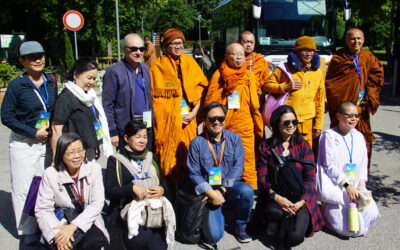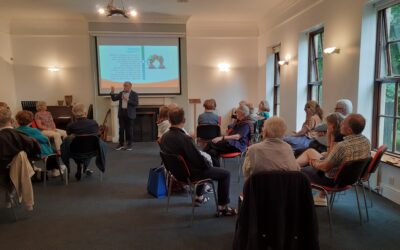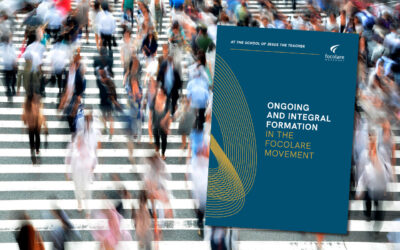 From Central and South America, to Europe, Afica and Middle East, fifty laboratories for forming people who are open, inclusive, world citizens who wish to offer the wealth of their own cultures while being open to that of others. Every three years the Focolare’s Teens for Unity hold a series of international workshops in which they can be formed in a culture of fraternity as the antidote to division, intolerance and hate. Each workshop had two phases. The first phase consisted in learning to know and respect the other’s culture as one’s own. The second, to take concrete action, especially in the most needy peripheries with the most disadvantaged people: the homeless, orphans, immigrants and Rom. In Lithuania, the teenagers of the workshops – which included groups from Switzerland – visited a hospital for the disabled and mentally ill where they managed to engage a girl who was usually unresponsive to any kind of stimulation. In the small European state of Škofia Loka, Slovenia, their goal was to engage the homeless. In Bratisslava, German and Slovak teenagers volunteered to clean the shores of the Danube, where they collected six tons of trash. There were also concerts, flashmobs, and folk festivals on several public squares of Eastern Europe which caught the curiosity and intererst of the media. Several teenagers were interviewed on national television at Mariapolis Faro. The Mariapolis in Croatia was turned into an international microcosm with 280 teenagers from 22 nations, and twelve translations for teenagers from such places as Palestine, Israel, Lebanon, Jordan, Syria and Venezuela. “When I talked with the guys from Venezuela,” says a girl from the Holy Land, “I found out that there are problems in every country. We’re at war, but at least we have food to eat. In Venezuela, they don’t even have any. So, I brought a basket and suggested that we put what we had in common.” Another teenager: “From now on, when someone asks me how many brothers and sisters I have, I’ll say 280!” “A group of girls arriving from the United State lost their luggage at the airport. The luggage was located and returned to them a few days later. In the meantime – used as they were to always having everything they needed – they experienced what it’s like to depend on the love (and clothing) of others. In Serbia, the workshop opened in Cardak, an hour drive from Belgrade. The teenagers were hosted at a state institute, in a wooded area where hundreds of refugees had recently passed from the Balkans: a simbol of beauty and suffering in the tormented march toward the unity of peoples, Churches and religions. They also experienced the diversity of religions – many of them Christian and Muslim – and of different traditions – among them Catholic, Orthodox, Lutheran, Evangelical and Anglican. Some didn’t confess any particular creed, but everyone felt perfectly integrated.
From Central and South America, to Europe, Afica and Middle East, fifty laboratories for forming people who are open, inclusive, world citizens who wish to offer the wealth of their own cultures while being open to that of others. Every three years the Focolare’s Teens for Unity hold a series of international workshops in which they can be formed in a culture of fraternity as the antidote to division, intolerance and hate. Each workshop had two phases. The first phase consisted in learning to know and respect the other’s culture as one’s own. The second, to take concrete action, especially in the most needy peripheries with the most disadvantaged people: the homeless, orphans, immigrants and Rom. In Lithuania, the teenagers of the workshops – which included groups from Switzerland – visited a hospital for the disabled and mentally ill where they managed to engage a girl who was usually unresponsive to any kind of stimulation. In the small European state of Škofia Loka, Slovenia, their goal was to engage the homeless. In Bratisslava, German and Slovak teenagers volunteered to clean the shores of the Danube, where they collected six tons of trash. There were also concerts, flashmobs, and folk festivals on several public squares of Eastern Europe which caught the curiosity and intererst of the media. Several teenagers were interviewed on national television at Mariapolis Faro. The Mariapolis in Croatia was turned into an international microcosm with 280 teenagers from 22 nations, and twelve translations for teenagers from such places as Palestine, Israel, Lebanon, Jordan, Syria and Venezuela. “When I talked with the guys from Venezuela,” says a girl from the Holy Land, “I found out that there are problems in every country. We’re at war, but at least we have food to eat. In Venezuela, they don’t even have any. So, I brought a basket and suggested that we put what we had in common.” Another teenager: “From now on, when someone asks me how many brothers and sisters I have, I’ll say 280!” “A group of girls arriving from the United State lost their luggage at the airport. The luggage was located and returned to them a few days later. In the meantime – used as they were to always having everything they needed – they experienced what it’s like to depend on the love (and clothing) of others. In Serbia, the workshop opened in Cardak, an hour drive from Belgrade. The teenagers were hosted at a state institute, in a wooded area where hundreds of refugees had recently passed from the Balkans: a simbol of beauty and suffering in the tormented march toward the unity of peoples, Churches and religions. They also experienced the diversity of religions – many of them Christian and Muslim – and of different traditions – among them Catholic, Orthodox, Lutheran, Evangelical and Anglican. Some didn’t confess any particular creed, but everyone felt perfectly integrated.  At Paztún, in the Maya Kapchikel region of Guatamala, the workshop from Central America gathered 160 teenagers from Panama, Costa Rica, Honduras, El Salvador and Guatamala, along with some teenagers from the Quiché ethnic group in Santa Lucia Utatlán. The indiscriminate chopping down of entire forests – a real wound to the land – urged them to plant on a stretch of public land, thousands of fur trees that were donated by the state.In the Southern Cone, Global Citizen took on the color of social action with projects that favored knowing one another and valuing the richness of the South American people. In the workshop at Cunaco. Educational and recreational workshops were held in Chile, along with solidarity projects. In Paraguay there were seminars, visits to Guaraní communities of Ita and a day with the teenagers from Barrio Vida, a social centre animated by the Focolare periphery of Motevideo. It included activities for children, workshops, sport tournaments and games for the public. In Argentina they shared in the life of their peers from the Island of Margherita, in the region of the Tigre, north of Buenos Aires on the Rio de la Plata.
At Paztún, in the Maya Kapchikel region of Guatamala, the workshop from Central America gathered 160 teenagers from Panama, Costa Rica, Honduras, El Salvador and Guatamala, along with some teenagers from the Quiché ethnic group in Santa Lucia Utatlán. The indiscriminate chopping down of entire forests – a real wound to the land – urged them to plant on a stretch of public land, thousands of fur trees that were donated by the state.In the Southern Cone, Global Citizen took on the color of social action with projects that favored knowing one another and valuing the richness of the South American people. In the workshop at Cunaco. Educational and recreational workshops were held in Chile, along with solidarity projects. In Paraguay there were seminars, visits to Guaraní communities of Ita and a day with the teenagers from Barrio Vida, a social centre animated by the Focolare periphery of Motevideo. It included activities for children, workshops, sport tournaments and games for the public. In Argentina they shared in the life of their peers from the Island of Margherita, in the region of the Tigre, north of Buenos Aires on the Rio de la Plata.
Have the courage to start again
Have the courage to start again




0 Comments